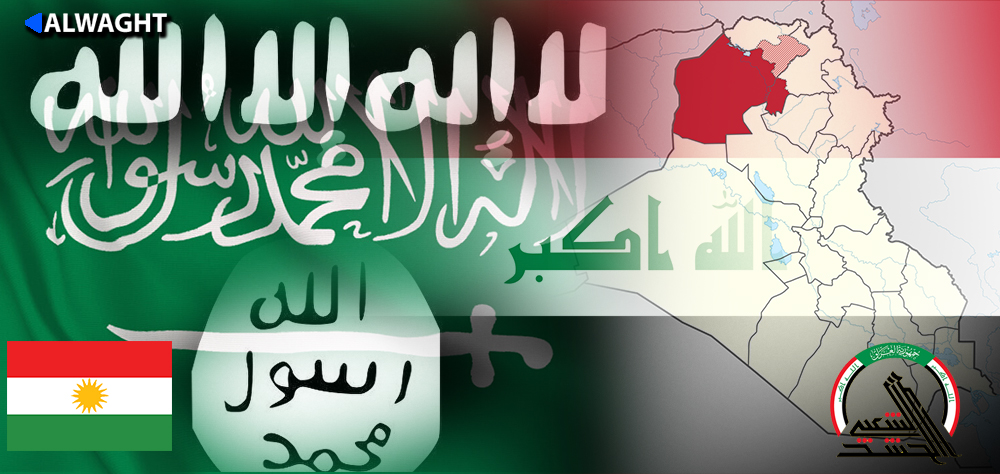Alwaght- Iraq's Popular Mobilization Forces (PMF) and Erbil leaders argue over control of Nineveh plains while the Arab country has been moving towards stability and security in various parts of the country. The Kurds, arguing that ISIS forces are present in Nineveh, call the province a safe haven of terrorists, but the PMF categorically rejects the comments, saying that they are driven by behind-the-scenes political agenda.
But what is driving the Kurdish claims about insecurity in Nineveh?
Conflicting Kurdish-PMF reports about security in Nineveh plains
Nineveh is home to a mix of Christian, Yazidi, and Arab population. The towns of Bartaleh, Karamlis, Al-Qush, Tal Saghf, Sharafiya, Bashhiqa, and Hamdaniyah all are located in northeast Mosul and are the subject of a Baghdad-Erbil dispute over who controls them. Actually, they are part of a broader dispute between the Kurdistan Regional Government (KRG) and the central government that should be settled by reference to the Article 140 of the national constitution.
The Nineveh plains were liberated from ISIS terrorist group in November 2016 after a joint operation launched by the Kurdish Peshmerga forces and the Iraqi regular army. The liberated area’s control was left to the army and the PMF. In recent days, however, the PMF commanders and Kurdish leaders exchanged remarks regarding terrorism threat in this part of Iraq.
Rashad Kalali, a senior member of the Patriotic Union of Kurdistan, recently warned that ISIS was present in the plains of Nineveh and posed a threat to the security of the autonomous region. Also, Diyar Barwari, a member of the Kurdistan Democratic Party (KDP) in the Iraqi parliament, said: “The plains of Nineveh are an open passage for the movement of the PMF between Iraq and Syria, and the operation in these large areas and its control is difficult due to the presence of areas far from the Iraqi forces.” The member of parliament emphasized that the Peshmerga forces and the central government agree on a joint presence in the plains to ensure security, but unfortunately some political forces prevent the army from cooperating with the Peshmerga.
On the other side, Saad Al-Ghadou, a PMF commander who is operating in the area, in a statement said: “Daesh poses no threat to the region.” He, who used an Arabic acronym to ISIS in his statement, described the remarks by Kurdish officials as "politically motivated.” Also, Abbas al-Zameli, a representative of the Fatah Coalition in the Iraqi parliament, dismissed the talks about the threat of ISIS in the Nineveh plains, explaining that the terrorist group could not reach the area because the conditions there were not suitable for its presence. Al-Zameli saw the controversy over the terrorist group as an excuse to intervene in the disputed areas between Baghdad and Erbil, and stressed that the return of the Peshmerga to the Nineveh plains was “unlikely.”
What is behind the Kurdish security threat claims in Nineveh?
Amid the Kurdish-PMF conflict of remarks, the question is that what is behind the Kurdish raising of alarms about security threats? The answer lies in two cases:
The Kurds seek to rebuild presence in the deputized regions
The government of Kurdistan region has called for the implementation of Article 140 of the constitution, which deals with disputes territories, in all the years since 2005, when the permanent Iraqi constitution was adopted. The “disputed regions” cover areas in Mosul, Kirkuk, Salahuddin, and Diyala which according to the constitution have to undergo a referendum to see the dispute over them settled. The Kurds lost much of their influence and power in the disputed regions in the years after 2017, when they suffered a major defeat as a result of the KDP’s efforts to split from Iraq via a widely-condemned referendum, but are now trying, contrary to field realities, to raise terrorism threats and the presence of the ISIS terrorist group with a hope to pave the way for their return to these regions, especially the plains and Kirkuk.
Arab-American lobbying to destabilize Iraq
In addition to the Kurdish role played through raising security and terrorism concerns in Nineveh plains, foreign actors like Saudi Arabia, the UAE, and the US are fueling such ISIS-related excuses to undermine the Axis of Resistance and the PMF. By persuading Erbil to make false allegations about the presence of terrorists in the Nineveh, these actors are trying to pave the way for the expulsion of the PMF from the northern regions of Iraq, in order to bring back instability and insecurity to Iraq by strengthening terrorist groups and thus prepare the ground for continued presence of American troops.
The Kurds and Erbil here play as enforcers and the main designer is the Arab-American lobby. These allegations are made while the PMF is one of the leading forces battling terrorism and played the biggest role in ISIS defeat in Iraq. Therefore, the claimants of insecurity are unlikely to make change in the makeup of the actors in Nineveh plains.



























